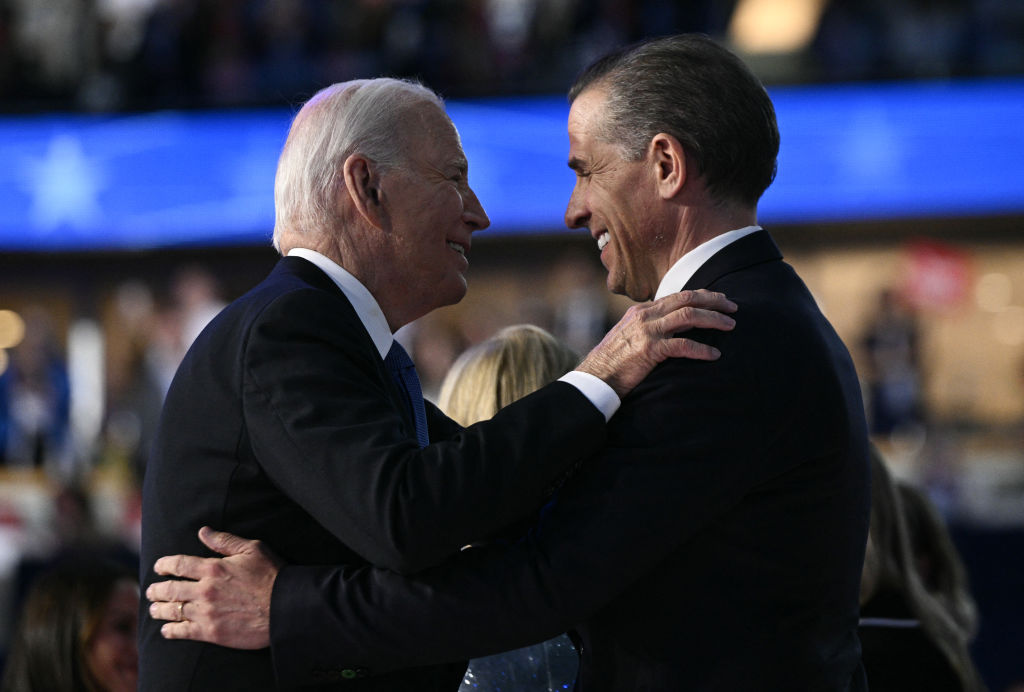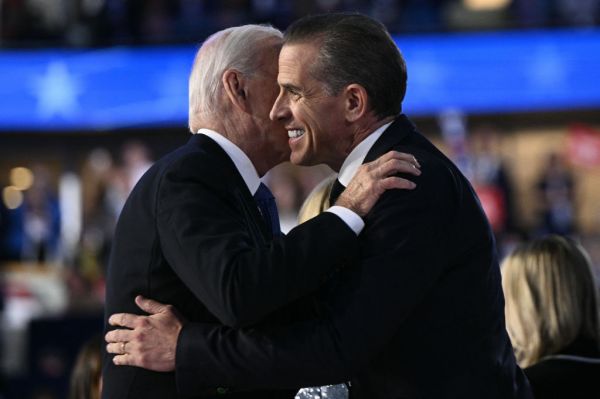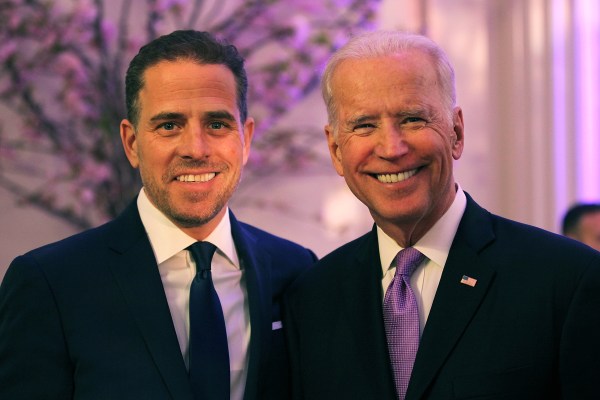Happy Tuesday! Oxford University Press’ word of the year is “brain rot.”
We want to prevent “brain rot” in the next generation of young conservatives, and that’s why we’ve partnered with student organizations to offer low-cost, high-quality Dispatch memberships to students across the country.
This Giving Tuesday, you can play a crucial role in this mission by sponsoring a student membership. Your contribution will help equip young Americans with the tools they need to stay informed, think critically, and engage in meaningful civic discourse.
Together, we can inspire responsible news consumption and uphold the timeless principles—individual liberty, pluralism, patriotism, and capitalism—that make our country great. Your generosity today will shape tomorrow’s leaders.
Quick Hits: Today’s Top Stories
- Romania’s top constitutional court on Monday ruled that the first round results of the country’s presidential election—which had far-right outsider Călin Georgescu in the lead and advancing to the second round with center-right Elena Lasconi—could go ahead. The ruling followed a recount prompted by accusations that Georgescu had benefited from favoritism on TikTok. The second round of voting will proceed on December 8. Meanwhile, the Romanian center-left party on Sunday came first in parliamentary elections but fell well short of a majority as three far-right parties surged—which will likely make it difficult for the Social Democrats to form a government.
- President Joe Biden on Monday arrived in Angola—after a refueling stop on the island nation of Cape Verde—on the first and only trip to sub-Saharan Africa of his presidency. He’s the first sitting president to visit the southern African country. On Tuesday, Biden is set to visit a slavery museum in the country before traveling to the south to highlight a railroad project partly funded by the United States to provide a route to facilitate the export of critical minerals to the West, instead of to China.
- Lawyers for Hunter Biden, President Joe Biden’s son, moved late on Sunday to have his gun and tax cases dismissed. Special counsel David Weiss, who brought the cases in Delaware and California, pushed back in court filings on the efforts to dismiss the cases, asking they instead be closed, meaning they’d remain on the record. Prosecutors also defended their investigations against accusations of political motivations. “In total, eleven different [federal] judges appointed by six different presidents, including his father, considered and rejected the defendant’s claims, including his claims for selective and vindictive prosecution,” prosecutors wrote in a Monday filing.
- President-elect Donald Trump on Monday warned that if all the Hamas-held hostages in Gaza were not released before his inauguration, “there will be ALL HELL TO PAY in the Middle East, and for those in charge.” The Israel Defense Forces (IDF) announced earlier on Monday that Omer Neutra, an Israeli-American soldier who was thought to have been taken hostage on October 7, was actually killed that day and his body taken to Gaza.
- The Defense Department on Tuesday announced a $725 million aid package to Ukraine through the Presidential Drawdown Authority, which allows the president to transfer weapons from U.S. military stockpiles. The package included munitions for surface-to-air missiles, High Mobility Artillery Rocket Systems, and counter-drone systems, as well as 155mm and 105mm artillery ammunition.
- Hezbollah on Monday fired on Mount Dov in the Golan Heights—the group’s first cross-border attack on Israel since the ceasefire went into effect on Wednesday. In response Israeli jets struck targets in Lebanon, including, the IDF said, the launchers used to fire mortars at Mount Dov. The truce agreed to last week requires Hezbollah and the IDF to withdraw from southern Lebanon over a 60-day period, and prevents either party from conducting offensive military operations. Israeli Prime Minister Benjamin Netanyahu said Monday that Hezbollah’s attack constituted a grave violation of the truce. Meanwhile, Lebanese officials claimed Israeli strikes over the weekend breached the terms of the ceasefire, though the IDF said they followed efforts by Hezbollah to access military sites.
- The House Oversight and Accountability Committee on Monday released its final report following its investigation of the COVID-19 pandemic, determining that the pandemic was the result of a leak from a lab conducting gain-of-function research in Wuhan, China. The report added that the government contributed to “misinformation” when it dismissed the lab leak theory. “Unfortunately, kneejerk reactions by the federal government did little to fix the problem and instead may have sowed deeper distrust of government institutions while trampling on the First Amendment of the Constitution,” the report states. The report also panned former New York Gov. Andrew Cuomo’s COVID-19 response, saying he “participated in medical malpractice and publicly covered up the total number of nursing home fatalities in New York.”
Pardon Me, Dad

Your Morning Dispatchers have done several tours of duty in the trenches of the years-long Hunter Biden saga: From the early details of the federal criminal investigation, to last summer’s charges and accompanying plea deal to resolve them … to that plea deal’s land-speed record implosion in open court, and Biden’s much-publicized gun charges trial, his subsequent conviction on those charges, and his last-minute guilty plea in a separate tax charges case.
That’s not to mention the whistleblower allegations of political interference favoring Biden in the Justice Department’s probe; the House Republican investigation into Hunter’s foreign business dealings featuring the president’s son and one of his close associates who testified in closed-door sessions on Capitol Hill; or the Justice Department indicting a key source underpinning the “Biden Crime Family” narrative and House Republicans’ impeachment inquiry of President Joe Biden, alleging the source fabricated his statements to federal law enforcement and apparently met with Russian officials.
So when the president issued a sweeping pardon for his son late on Sunday night, we might have hoped the Hunter Biden story was finally over. But we know better by now.
The pardon fully clears Hunter Biden of federal prosecution for conduct that occurred between January 1, 2014, and December 1, 2024—whether or not he’d yet been prosecuted for it—as Biden was due to be sentenced in the federal gun and tax cases later this month.
The pardon marked a stark reversal of the repeated claims by the White House and the president himself that he would respect the legal outcomes of his son’s trials, and even some of the president’s Democratic allies have criticized the pardon, particularly given how he is justifying it.
For more than a year, Joe Biden and his spokespeople repeatedly said a pardon for Hunter was off the table. “We’ve been asked that question multiple times, our answer stands, which is no,” press secretary Karine Jean-Pierre said as recently as last month. On June 6, the president told ABC News he would accept the verdict in his son’s gun case no matter the outcome and that he had ruled out a pardon.
“I said I’d abide by the jury’s decision, and I will do that, and I will not pardon him,” Joe Biden said on June 13, two days after Hunter was convicted on the gun charges.
In the weeks after the conviction, the president’s allies spent plenty of time applauding his respect for the justice system and the rule of law, contrasting his promise not to intervene in his son’s case with President-elect Donald Trump’s contempt for judicial accountability.
Joe Biden released a statement Sunday explaining why he’d flipped on the issue. “I would not interfere with the Justice Department’s decision-making, and I kept my word even as I have watched my son being selectively, and unfairly, prosecuted,” he said. “For my entire career I have followed a simple principle: just tell the American people the truth. They’ll be fair-minded. Here’s the truth: I believe in the justice system, but as I have wrestled with this, I also believe raw politics has infected this process and it led to a miscarriage of justice.” The comments not only suggest the president was for months not telling the truth about the pardon, but also amount to a stunning indictment of Joe Biden’s own Justice Department.
The president argued that his son was singled out for prosecution since federal prosecutors rarely bring the gun charges in such cases or pursue criminal sentences for people who’ve paid back owed taxes. And depending on how you look at it, he’s got a point. As Sarah and others have noted, “There has never been another federal prosecution for lying about drug use on a gun form where there was just one gun, the gun was not used in a crime, there was no other crime committed with the gun, and the person had no criminal record.”
Even some unlikely Republican lawmakers initially criticized the gun charges. At the same time, while drug use while possessing a firearm charges are often hard to prove, Hunter Biden had openly detailed his struggle with addiction and substance abuse in his memoir during a time frame that matched when he bought the gun. The tax charges, on the other hand, are more common, but are sometimes resolved without charges if the money is paid back.
But the broad scope of the pardon gets at another potential motivation for it: fear of being targeted by the incoming Trump administration. The president didn’t mention Trump in his statement but said “there’s no reason to believe” the alleged selective prosecution of Hunter Biden “will stop here.”
Democratic Sen. Chris Coons of Delaware, a close Biden ally, argued this fear is what explains Biden’s shift. “I think what changed was that President-elect Trump put people in place who made it really clear that they intended to go after, not just anybody, but in their campaign activity, had talked about going after Hunter Biden directly,” he said.
There’s perhaps reason for the Bidens to fear retribution from a president who openly campaigned on using federal law enforcement to go after his political opponents. Trump’s announcement Saturday that he was picking Kash Patel—who has said previously that Hunter Biden should be prosecuted under the Foreign Agents Registration Act (FARA) for his foreign business dealings—to run the FBI loomed over the pardon news. The pardon also protects Hunter Biden from any potential FARA prosecutions—the Justice Department reportedly investigated potential violations related to his business dealings and didn’t bring any charges, but special counsel David Weiss alleged that the younger Biden was wary of violating the statute.
Details of the investigation make it fairly clear that Hunter Biden traded off his father’s name for personal gain to the tune of millions of dollars—and it’s a meager defense to say that he likely avoided legal violations by selling the “illusion of access” to his father rather than engaging in actual influence peddling. In a statement after the pardon, he cast his actions in the gun and tax cases as mistakes resulting from his addiction and said they’ve been “exploited” for “political sport.” He made no reference to his foreign business dealings.
Some legal observers have pointed out that Joe Biden could have structured the pardon in a way that didn’t undermine the credibility of the Justice Department but preempted targeting by the Trump administration. He could have simply issued a pardon on any uncharged crimes but let the tax and gun convictions stand, or he could have commuted the future sentencing decisions in the two cases. Instead, the president opted for a broad pardon and justified it by claiming political bias by federal prosecutors.
Special counsel Weiss isn’t taking the allegation sitting down. His office filed a motion on Sunday in the tax case requesting the judge close the docket on the case instead of simply dismissing it, which would preserve the record of the indictment. Prosecutors included a thinly veiled rebuttal to Biden’s claims. “There was none and never has been any evidence of vindictive or selective prosecution in this case,” the filing noted. “In total, eleven different [federal] judges appointed by six different presidents, including his father, considered and rejected the defendant’s claims, including his claims for selective and vindictive prosecution.”
The political backlash to the pardon has been swift. Republicans have unsurprisingly lambasted Joe Biden for the move—but so have some Democrats. “This was an improper use of power, it erodes trust in our government, and it emboldens others to bend justice to suit their interests,” Sen. Gary Peters of Michigan said Monday. Democratic Sen. Tim Kaine of Virginia said he was disappointed by the president’s decision, and Sen. Michael Bennett of Colorado offered a particularly strong rebuke: “President Biden’s decision put personal interest ahead of duty and further erodes Americans’ faith that the justice system is fair and equal for all.”
The irony in the situation is that as Biden nears the end of his presidency, one of his final acts adopts the same rhetoric Trump used against his own criminal cases: that the justice system was being weaponized for political purposes. But just six months ago, Biden had a message for Trump after his criminal conviction in New York: “Stop undermining the rule of law, stop undermining the institutions.”
“He got a fair trial,” Biden said of Trump. “The jury spoke, like they speak in all cases, and it should be respected.”
Worth Your Time
- BBC reporter Lyse Doucet made a rare visit to West Darfur in Sudan, an area devastated by a civil war nearing its two-year mark. “No-one lives in the ghostly outskirts of el-Geneina any more,” Doucet wrote. “But its empty buildings still stand to tell their shocking stories, loudly and clearly. Charred homes and shops are peppered with bullet holes. Doors are wrecked. Metal shutters are smashed. Rusting Sudanese army tanks dot the streets. In this rare trip for international journalists into Darfur, we could still smell the fires which blazed here last year. … It was RSF fighters, along with allied Arab militias, who ran amok in el-Geneina last year, mainly targeting residents from the non-Arab Masalit community in what human rights groups, including UN experts, have described as ethnic cleansing and possible war crimes and crimes against humanity. Human Rights Watch concluded it was a possible genocide.”
- Something happened to journalists when Donald Trump was elected, Yascha Mounk wrote for Persuasion. “The new self-conception adopted by a large share of American journalists was at once less demanding and more self-aggrandizing than the one it replaced. It was less demanding because it provided them with the perfect excuse for indulging in their own biases: giving favor to your own side was recast from being a failure of professional ethics to being a brave act of resistance. Simultaneously, it was more self-aggrandizing because it seemingly transformed journalists from humdrum stenographers of the first draft of history to key actors in a grand historical battle for the preservation of democracy. … The aspiration of many journalists to save democracy has not just proven counterproductive because it drove a big part of their readership away from mainstream outlets. It has also deprived Democrats of key facts they would have needed to make good strategic decisions—which, ironically, has helped to strengthen the very political forces that the journalists who were self-consciously striving to preserve democracy were trying to contain.”
Presented Without Comment
Reuters: Putin Drops Plan for ‘Friendship Games’ to Rival Olympics
In the Zeitgeist
Now that Thanksgiving Day has passed and we can listen to Christmas music without judgment from seasonal purists, we thought we’d share this reimagined Christmas standard (and that is not Mariah Carey’s “All I Want for Christmas is You”). Enjoy the Punch Brothers’ version of “O Come, O Come, Emmanuel.”
Toeing the Company Line
- In the newsletters: Nick examined (🔒) Biden’s decision to pardon his son.
- On the podcasts: Sarah and David discuss Kash Patel’s nomination and Hunter Biden’s pardon on Advisory Opinions and Jamie was joined by Michael Mazza to respond to last week’s Dispatch Podcast episode about Taiwan.
- On the site: Chris shares his thoughts on the Hunter Biden pardon, Paul Miller considers claims that Trump is a “fascist,” and Justin Perry looks into Dr. Jay Bhattacharya, Trump’s pick to head the National Institutes of Health.
Let Us Know
How do you explain Biden’s decision to pardon Hunter?











Please note that we at The Dispatch hold ourselves, our work, and our commenters to a higher standard than other places on the internet. We welcome comments that foster genuine debate or discussion—including comments critical of us or our work—but responses that include ad hominem attacks on fellow Dispatch members or are intended to stoke fear and anger may be moderated.
With your membership, you only have the ability to comment on The Morning Dispatch articles. Consider upgrading to join the conversation everywhere.